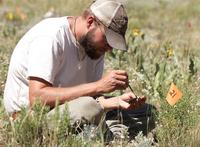EPA Recognizes Outstanding Doctoral Student in Biological Science

A doctoral student from the Department of Biological Science, Joshua Grinath, is the recipient of the Environmental Protection Agency’s Science to Achieve Results (EPA STAR) Fellowship for graduate environmental study.
Grinath has been conducting research at the Rocky Mountain Biological Laboratory (RMBL) on the indirect effects of nitrogen pollution in food webs.
He explains, “Humans have dramatically altered earth’s nitrogen cycle by increasing the availability and mobility of biologically useful forms of nitrogen; specifically, atmospheric nitrogen deposition has increased due to pollution from fossil fuel combustion and agricultural operations. My research examines how atmospheric nitrogen pollution causes changes in the strengths of interactions among species in a food web describing a widespread ecosystem in the western U.S.”
Grinath’s research explores one of the research priorities for the EPA – Ecosystem Services. Specifically, Grinath focuses on understanding terrestrial systems and animal ecology. “Using an experiment that mimics high levels of nitrogen deposition in a nitrogen-poor mountain meadow, I am testing whether increased nitrogen results in higher food quality and stronger trophic cascades, whereby ants will have stronger effects on herbivorous bugs and the plants they live upon. These interactions are important for the functioning of the ecosystem, and this study has the potential to contribute to regulatory decisions for pollutants causing greater nitrogen deposition.”
The EPA STAR Fellowship will enable Grinath to continue his research at the Rocky Mountain Biological Laboratory, where he has conducted summer research for the past eight years. Additionally, he will be able to extend his research through the growing season in his experiments. Grinath is conducting his research under the supervision of Dr. Nora Underwood, an expert in the ecology of plant-insect interactions, and Dr. Brian Inouye, who specializes in spatial and temporal variations in community ecology.
The STAR Fellowship program began in 1995 and was created to promote education and careers in the environmental field. Benefits of the fellowship may include up to $12,000 per year for tuition and fees, a $25,000 per year stipend, and an annual expense allowance of $5,000. Each year, the EPA announces priority research areas that will be supported through the multi-year fellowship. Previous topics include Emerging Environmental Approaches and Challenges, Water Quality, Green Energy, and Ecosystem Services.
Grinath is the second student from FSU to receive the EPA STAR Fellowship. Nathaniel Jue, who was also a graduate student in Biological Sciences, was a recipient of the award in 2005.
